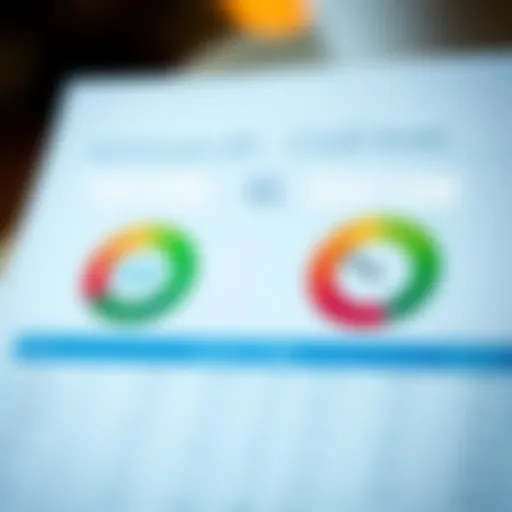Understanding Ethical Business Standards Today


Intro
In the shifting terrain of today's corporate world, the principles of ethical business standards remain a cornerstone for success. As businesses navigate challenges caused by globalization, technological advancement, and evolving consumer expectations, the spotlight on integrity, accountability, and transparency becomes increasingly critical. These ethical standards not only foster trust but also build a solid reputation that can withstand market turbulence.
While many companies may claim to adhere to ethical practices, the reality often presents a different picture. Substantiated commitment to ethical norms influences not just the internal environment of the company but extends its reach to customers and partners, affecting their trust levels and overall satisfaction. In this examination, we'll delve into the significance of ethical business standards, ultimately presenting a guide to implementing a strategic framework that aligns company practices with fundamental principles.
"Ethics is knowing the difference between what you have a right to do and what is right to do." - Potter Stewart
As we unpack these issues, it will become evident how pivotal these standards are in enhancing employee morale and fostering consumer loyalty. By aligning business operations with ethical considerations, companies not only secure their position in the market but also contribute to long-term sustainability. This approach cultivates a culture of respect and responsibility, serving as the bedrock on which successful enterprises are built.
Through subsequent sections, readers will find a systematic breakdown of the components of ethical business standards, practical strategies for risk mitigation, and actionable insights into creating a compliant corporate culture.
Understanding Ethical Business Standards
In today's rapidly changing corporate landscape, understanding ethical business standards is not merely advisable; it's essential. Companies are increasingly recognized not only for their financial performance but also for their ethical behavior. For investors, financial advisors, and analysts, reflecting on these standards is vital in evaluating the sustainability and growth potential of businesses. Ethical business practices foster an environment of trust, which in turn influences stakeholder loyalty and, ultimately, profitability.
Defining Ethical Standards
Ethical standards provide a framework for what constitutes acceptable conduct within a business context. These standards encompass principles such as fairness, honesty, and respect for individuals and the environment. Defining ethical standards goes beyond the avoidance of wrongdoing; it entails actively promoting practices that encourage responsibility. For instance, adopting fair labor practices is a sign of ethical commitment. It's not just about following laws; it's about exceeding them and ensuring that every stakeholder— employees, customers, and the community—benefits from the business operations.
The Evolution of Business Ethics
The landscape of business ethics has shifted significantly over the decades. In the early days of capitalism, ethical considerations often took a backseat to profit maximization. However, as society's expectations evolved, so did business practices. The rise of corporate social responsibility in the late 20th century marked a turning point, prompting companies to not only think about their bottom line but also about their societal impact. Now, businesses are expected to align their strategies with ethical standards that reflect broader societal values. It's a continuous journey, with modern companies adapting to new challenges such as climate change and digital privacy.
Importance of Ethics in Business
The importance of ethics in business cannot be underestimated. A strong ethical foundation enhances a company's reputation, fortifies stakeholder relationships, and bolsters consumer trust. Ethical businesses often enjoy higher levels of employee satisfaction and retention. Employees are more likely to be engaged and motivated when they feel their employer is committed to high standards of integrity. Furthermore, ethical lapses can have dire consequences, including legal penalties and damage to brand reputation. Companies that prioritize ethics are better positioned to navigate crises, seize opportunities, and achieve long-term success.
"A business that operates on sound ethical principles not only flourishes but also uplifts its community, creating a win-win scenario for all involved."
In summary, understanding ethical business standards is critical for companies aiming to thrive in the modern economy. These standards define acceptable behavior, represent the evolution of corporate responsibility, and highlight the significant impact ethics have on a business's long-term viability.
Key Components of Ethical Standards
Understanding the key components of ethical standards is fundamental when discussing their application in business. These components create the very backbone of a company's ethical framework, impacting decision-making processes, corporate governance, and overall company culture. When organizations internalize these elements, they not only enhance their reputation but also strengthen their relationships with stakeholders. Let's delve deeper into the core components that form ethical standards: integrity, accountability, and transparency.
Integrity as a Core Principle
Integrity stands as the cornerstone of ethical conduct in any business environment. It encompasses honesty, ethics, and moral principles that guide behaviors within the corporate landscape. Companies that prioritize integrity tend to foster a culture where employees feel empowered to make ethical choices, regardless of the pressure that may arise in challenging situations.
For example, a technology firm like Salesforce emphasizes integrity by committing to ethical leadership and ensuring that its values are uniformly practiced across all levels of the organization. This forms a cycle of trust where employees feel supported, leading to increased productivity and job satisfaction. Furthermore, cultivating integrity can protect a company from legal troubles. If a business is known for its integrity, it is less likely to encounter scandals, thereby preserving its public image and liabilities.
Accountability in Business Practices
Accountability is another pivotal element of ethical standards that ensures every action and decision made by employees and management is answerable to stakeholders. Without accountability, ethical standards merely exist as abstract concepts, devoid of any real impact. Organizations that hold their employees accountable are better equipped to implement ethical practices effectively.
Take Starbucks, for instance. The coffee giant has established measures to ensure accountability at every level of its organization. This means that not only are employees encouraged to adhere to ethical practices, but they also face repercussions for unethical behaviors. By integrating comprehensive accountability policies, such as performance reviews that reflect ethical practices, businesses can cultivate a culture where ethics is front and center.
Transparency and Disclosures
Transparency serves as the window through which stakeholders can view the inner workings of a business. It involves openly sharing relevant information, whether it be financial performance or operational decisions. When organizations maintain transparency, they foster trust among investors, employees, and customers alike. This is crucial in today’s dynamic marketplace, where information spreads faster than wildfire.
For example, Unilever has adopted a model where it discloses sustainability targets and performance metrics to its stakeholders. Such transparency demonstrates a commitment to ethical standards and allows stakeholders to assess the company’s commitment to its corporate social responsibilities. Moreover, it encourages other businesses to operate under similar guidelines, shifting the industry standard toward greater openness.


Ethical standards are not just about compliance; they are about weaving integrity, accountability, and transparency into the fabric of everyday business practices.
Implementing Ethical Standards in Organizations
Implementing ethical standards within organizations is a linchpin for ensuring that a business not only thrives but also earns the trust of its stakeholders. The landscape of business is often rife with challenges, and adhering to a robust ethical framework can guide companies through these murky waters. But establishing this framework is not merely about ticking boxes; it's about embedding a philosophy into the very DNA of the organization.
Establishing a Code of Ethics
A well-crafted code of ethics serves as the cornerstone of an ethical organization. It outlines the principles that guide the behavior of employees and managers alike. By providing clear expectations, a code helps align individual actions with the overarching goals of the business. It's not just a document; it’s a manifesto that shapes culture.
- Components of a Code of Ethics:
- Values: Identify the core values that reflect what the organization stands for.
- Standards of conduct: Specify acceptable and unacceptable behaviors.
- Reporting mechanisms: Offer a safe way for employees to voice concerns or report unethical conduct.
Adopting a comprehensive code can also be a tool for risk management, minimizing the potential for ethical violations that could lead to scandals or financial loss. As such, it’s essential that this document is not relegated to a drawer; it should be a living guide. Regular reviews and updates are crucial to ensure relevance and effectiveness.
Training and Awareness Programs
Once a code of ethics is established, creating awareness and providing training becomes essential. Employees might read the code, but understanding how to apply it in daily operations isn't always intuitive. Training programs are key to bridging this gap. They serve as an opportunity to illustrate real-world scenarios that the employees might face, promoting critical thinking around ethical decision making.
- Benefits of Training Programs:
- Enhanced clarity on ethical dilemmas.
- Improved employee morale as individuals feel empowered to act ethically.
- Strengthened solidarity among employees who share a common ethical ground.
Training should be continuous; ethics cannot be a once-a-year topic during meetings. Instead, embedding training into the fabric of the organization helps keep ethical considerations top-of-mind. Being proactive in this area not only helps with compliance but also fosters an environment of trust, innovation, and collaboration.
Creating a Culture of Ethics
An ethical code and training programs alone do not create a sustainable ethical environment. An organization must create a culture of ethics, where ethical behavior is not just encouraged, but celebrated and recognized. This culture can manifest itself in various forms, such as leadership modeling ethical behavior, providing a platform for ethical concerns to be discussed openly, and rewarding integrity.
- Elements of a Culture of Ethics:
- Leadership Commitment: Leaders must not only talk the talk but also walk the walk.
- Open Communication: A culture that encourages discussions on ethics will mitigate risks associated with unethical practices.
- Recognition and Rewards: Recognizing those who embody ethical behavior helps reinforce the message that ethics are integral to the company’s success.
In this fast-paced world, the way an organization treats ethical standards can have long-ranging effects. Companies that prioritize ethical practices create an environment that not only minimizes risks and enhances reputability but also attracts loyal customers and employees. The soundness of how ethical standards are implemented speaks volumes in a company’s long-term viability.
To put it candidly, the price of failure to uphold ethical standards can cost companies much more than any immediate gains from unethical actions.
Challenges in Upholding Ethical Standards
Ethical standards may seem like straightforward guidelines, but applying these principles in the real world can be likened to walking a tightrope. Numerous factors come into play, causing organizations to stumble or even fall off balance. Recognizing and addressing the challenges that come with upholding ethical standards is not merely an option but a necessity for any business committed to integrity and accountability.
Conflicts of Interest
One of the hallmark challenges in maintaining ethical standards is the pervasive issue of conflicts of interest. Conflicts can arise when personal motivations interfere with professional responsibilities. For example, a manager might prefer a vendor who is a friend, even if that vendor isn't the best choice. This not only raises eyebrows but can also damage relationships and trust within the organization.
"More than just being black and white, ethical dilemmas often occupy a grey area, making the right choices incredibly complex."
To combat this, organizations must foster an environment that encourages transparency. By establishing clear protocols for disclosure, teams can navigate these tricky waters. Moreover, creating a culture where employees feel comfortable reporting conflicts can prevent small issues from snowballing into significant ethical breaches.
Pressure from Stakeholders
The pressure from stakeholders is another formidable opponent to ethical standards. Businesses often face competing interests from shareholders, customers, and employees, all voicing their needs. A powerful shareholder might push for maximizing profits at the expense of ethical considerations, putting management in a tight spot. It's as if they are caught between a rock and a hard place.


Implementing strategies to ensure stakeholder interests are well-managed is essential. Frequent communication can help align the expectations of various groups and clarifies how ethical practices contribute to the long-term success of the company. Ideally, businesses should strive for a middle path that honors the interests of stakeholders while upholding their commitment to ethics.
Global Differences in Ethics
When one takes a global business approach, another layer of complexity unfolds. Different cultures hold diverse views on ethics, which can lead to hefty misunderstandings. For instance, gift-giving is often considered a gesture of goodwill in some cultures, while in others, it could be viewed as a form of bribery. This diversity might lead organizations to accidentally cross ethical lines, triggering public relations disasters or legal issues.
To tackle these global differences, businesses need to invest in cultural sensitivity training. Understanding local customs and ethical frameworks fosters mutual respect and minimizes risks. Organizations should adapt their ethical guidelines to embrace the nuances of the various markets they operate within.
In summary, as we navigate the challenges in upholding ethical standards, it becomes apparent that these roadblocks, though daunting, can be managed through awareness, communication, and education. The road less traveled may come with its barriers, but the destination of trust and reputation is well worth the journey.
The Impact of Ethical Standards on Stakeholders
Ethical standards serve as the bedrock for various facets of contemporary business, guiding interactions not just within the organization, but also with external stakeholders. These principles play a crucial role in demonstrating a company’s commitment to moral practices, which can significantly affect relationships across the board. Let’s break down how these standards establish a foundation for trust and reliability with three key stakeholder groups: employees, consumers, and investors.
Employee Morale and Retention
When employees sense that their workplace operates ethically, it reflects positively on morale. A setting that prioritizes integrity leads to a more satisfied workforce, which can reduce turnover rates significantly. Businesses that openly communicate their ethical expectations often foster an environment where employees feel valued. The simple act of incorporating employee feedback into ethical policies can make all the difference.
- Trust and respect: Employees want to work for a company that respects them. When management practices transparency about decisions, it nurtures trust.
- Job satisfaction: Being part of an ethical organization boosts job satisfaction. Employees take pride in their work, knowing their company contributes positively to society.
- Reduced turnover: Satisfied employees are likely to stick around. High retention rates save costs related to recruitment and training new employees, making it a smart financial decision as well.
"Organizations committed to ethical standards not only create a better workplace but also position themselves as attractive employers in competitive job markets."
Consumer Trust and Brand Loyalty
Ethical conduct resonates with consumers, often influencing their purchasing decisions. In an age where information is readily accessible, consumers are increasingly inclined to support brands that align with their values. Ethical standards can elevate a company’s standing, leading to long-lasting brand loyalty.
- Consumer preferences: Shoppers are leaning toward brands that engage in fair trade practices and treat their employees ethically. They'll often avoid businesses with public controversies related to unethical practices.
- Social responsibility: Companies that actively work to improve their communities, such as donating a portion of profits or implementing sustainable practices, win consumer admiration and loyalty.
- Reputation management: A strong ethical stance can deflect negative attention during crises. Brands with a reputation for integrity are often more forgiving in the eyes of consumers during challenging times.
Investor Confidence and Financial Performance
Investors today are increasingly aligned with ethical frameworks. A robust set of ethical standards signals to investors that a company is poised for sustainable growth. This alignment can lead to stronger financial performance, as well.
- Attracting investment: Ethical businesses are seen as lower-risk investments. Investors are likely to pour their resources into companies with a solid ethical foundation, knowing they prioritize long-term viability over short-term gains.
- Financial metrics: Research has indicated that companies adhering to ethical standards tend to outperform their peers financially. This occurs as ethical considerations can mitigate risks and enhance brand perception.
- Stakeholder engagement: Solid ethical practices can help in maintaining a favorable dialogue with investors, allowing companies to build constructive relationships and creating a buffer during economic downturns.
Future of Ethical Business Practices
The future of ethical business practices is a vital topic of discussion in the current corporate landscape. As society evolves, so does the expectation on businesses to operate not just with profit in mind but with a moral compass guiding their decisions. In an age where information travels fast, businesses are scrutinized more than ever. This presents a unique opportunity for organizations to embed ethical considerations into the very fabric of their operations, ensuring long-term success and sustainability.
Emerging Trends in Business Ethics
One of the most significant trends in business ethics is the shift towards sustainability. Consumers and investors are increasingly favoring companies that demonstrate a commitment to environmental stewardship. As a result, many businesses are adopting sustainable practices that reduce their carbon footprint, such as using renewable energy sources or implementing waste reduction strategies.
- Corporate Social Responsibility (CSR): More organizations are realizing that CSR is no longer just a buzzword but an expectation from stakeholders. Companies are engaging in community programs, supporting local economies, and addressing social issues relevant to their operations.
- Social Media Accountability: With the rise of social platforms, any unethical behavior by a corporation can quickly make headlines. This real-time accountability encourages businesses to operate ethically.
- Diversity and Inclusion: A growing number of firms are prioritizing diversity and inclusivity in their workforce, recognizing that varied backgrounds lead to innovative ideas and solutions.
Technological Advances and Ethical Considerations
The rapid advancement of technology brings with it numerous ethical challenges. Companies must navigate this evolving landscape responsibly. For instance, the rise of artificial intelligence and big data can lead to ethical dilemmas pertaining to privacy and consent.
Businesses need to be transparent about how they collect and utilize data. Algorithms should be regularly audited for biases to avoid perpetuating inequality.
- Data Protection: Adhering to regulations like GDPR show customers that their data is safe, fostering trust.
- AI Ethics: As AI systems become prevalent, ethical guidelines must accompany their use to mitigate the risk of discrimination.
Innovation and ethics must go hand-in-hand. Firms that ignore the ethical implications of their technological ventures risk facing backlash that could damage their reputation.


The Role of Regulation in Ethics
The role of regulation in shaping business ethics is increasingly significant. As governments and organizations worldwide recognize the impact of unethical practices, they are implementing stricter regulations to ensure compliance. This trend is evident in various sectors, particularly finance and healthcare.
- Regulatory Frameworks: Guidelines such as the Sarbanes-Oxley Act aim to enhance transparency and protect investors from corporate fraud. Companies must adapt their practices to align with these laws.
- International Standards: Organizations like ISO create frameworks for ethical business practices that can be applied globally, guiding companies in various regions to operate ethically.
"Regulations act as a double-edged sword, providing necessary oversight while also ensuring businesses uphold high ethical standards."
Overall, regulatory measures not only protect consumers and businesses, but they also drive ethical conduct in the corporate arena.
Measuring Ethical Success
Measuring ethical success is critical for organizations striving to cultivate a reputation rooted in strong ethical practices. In today’s intricate corporate environment, where stakeholders are more conscious than ever about a company's ethical standings, being able to gauge this success becomes paramount. This process is not merely about maintaining compliance with regulations; rather, it speaks to the heart of engaging sincerely with those impacted by the business. It empowers companies to understand their ethical performance and make strides in areas needing improvement.
Key Performance Indicators for Ethics
Key Performance Indicators (KPIs) serve as the yardstick for evaluating how well an organization adheres to its ethical standards. These metrics can include:
- Employee engagement scores related to ethical culture.
- The number of reported ethical violations or grievances.
- Customer trust and satisfaction ratings.
- Frequency and attendance at ethics training sessions.
- Analysis of whistleblower reports.
Focusing on these indicators can unfold a narrative about the ethical fabric of the business. For instance, a consistent rise in employee engagement scores may reveal that the workforce feels empowered and valued in an ethically-driven environment. Conversely, a spike in reported violations could signal underlying issues that need addressing. An organization can only improve its ethical practices by scrutinizing these indicators regularly and adapting to feedback accordingly.
Feedback Mechanisms and Assessments
Feedback mechanisms, such as surveys and interviews, provide businesses with insights into their ethical standing. They allow employees, consumers, and other stakeholders to voice their honest opinions about the company’s practices without the fear of repercussions. Implementing an anonymous reporting system can further encourage openness within the corporate culture.
Regular assessments through these feedback channels can highlight discrepancies between the organization’s perceived and actual ethical practices. Understanding this divergence is crucial. The more a company values and integrates feedback, the more it can hone its ethical practices and safeguard its reputation against potential crises. As an example, a corporation observed a worrying trend where employees felt uncomfortable reporting ethical breaches. By introducing anonymous channels for reporting and acting on the feedback collected, the organization not only elevated its ethical profile but also improved employee morale.
Long-Term Benefits of Ethical Practices
The perks of ethical practices extend far beyond avoiding legal troubles. Long-term benefits include fostering a loyal customer base and nurturing a motivated workforce. Companies that prioritize ethics often enjoy:
- Enhanced brand loyalty: Consumers are more likely to stick with brands that align with their values.
- Stronger employee retention: A positive ethical culture leads to sustainable employee satisfaction and reduces turnover rates.
- Positive reputation: A company known for its honest dealings can attract better partnerships and investments.
"The reputation of a company as a good ethical player can translate into tangible financial success."
In investment circles, this notion isn’t lost. Investors actively seek out firms that showcase robust ethical standards, recognizing that these companies are less likely to face scandals or legal issues, leading to sustainable profitability over time. Simply put, when ethical practices are woven into the fabric of a business, they create a sturdy foundation for long-term success.
Closure
Understanding the role of ethical business standards is imperative in today's complex corporate environment. By adhering to these principles, businesses can not only navigate the murky waters of competition but also create an environment where trust and integrity thrive. This article has delved into the essential components of business ethics and their ripple effect on various stakeholders, including employees, consumers, and investors.
Summary of Key Insights
In this exploration of ethical business standards, there are several salient points to consider:
- Ethics as a Foundation: Establishing a clear code of ethics sets the tone for every action within an organization. This foundation is crucial for guiding employees in their decision-making processes.
- Stakeholder Impact: Ethical practices significantly enhance employee morale, which in turn lowers turnover rates. Higher morale correlates with increased productivity, benefiting the organization overall.
- Consumer Loyalty: Transparency and honesty in marketing and communications build trust with consumers. Brands that prioritize ethics tend to enjoy sustained customer loyalty.
- Financial Returns: Investors are increasingly maneuvering toward companies that exhibit ethical behavior, understanding that such practices contribute to long-term profitability.
These insights showcase how ethical norms not only protect a company’s reputation but also foster a sustainable business model that can withstand the test of time.
Call to Action for Businesses
For businesses aiming to embrace ethical practices, the pathway is clear but requires commitment:
- Develop Comprehensive Ethics Programs: Create a tailored code of ethics that reflects your business’s culture and values. This framework must be easily accessible and communicated throughout the organization.
- Invest in Training: Regular training programs should be instituted, educating employees on the significance of ethics and best practices. This ensures that everyone in the organization is aligned with the company's values.
- Foster Open Communication: Encourage a culture where employees feel comfortable discussing ethical dilemmas. Creating effective feedback mechanisms can aid in maintaining transparency and accountability.
- Engage Stakeholders: Dialogues with stakeholders—be it employees, consumers, or investors—should be encouraged. This ensures that business practices reflect broader societal values and expectations.
By proactively addressing ethical standards in business practices, companies will not only bolster their reputations but also pave the way for sustainable growth, ensuring that their practices align with the values of their stakeholders.
"In a world where business practices are often scrutinized, maintaining a steadfast commitment to ethical standards can make all the difference in unequivocally building trust and credibility."
Embracing ethical standards will ultimately lead to a healthier corporate climate, ensuring various benefits that resonate throughout the organization and into the community.







